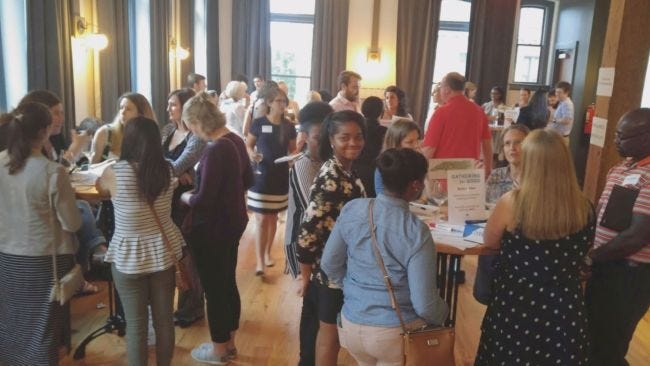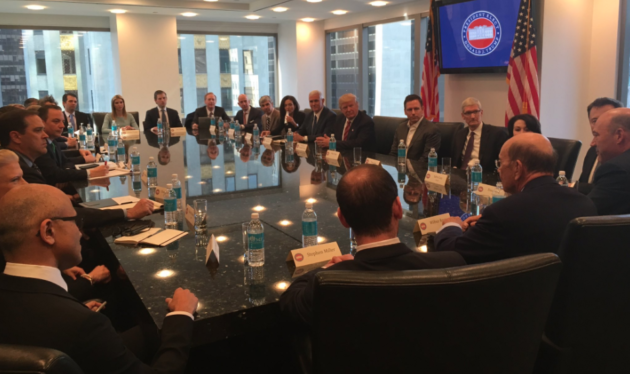Let’s Not Surrender Romance to Trumpism and Silicon Valley
It is an irony of history that it took a nihilistic businessman like Trump to brutally expose a forgotten, profound human desire.
By Tim Leberecht

“Is Trumpism a form of romanticism?”
That was the first audience question I received after giving a talk on humanizing the workplace, based on my book, The Business Romantic, to 3,000 Brazilian business leaders at a management forum in Sao Paulo. I felt nervous on stage, shaken and vulnerable. I had just woken up to the news that Donald J. Trump won the US election. Later that day, in a session hosted by IBM, someone wondered: “Have we become so fixated on data that we’ve forgotten essential human needs along the way?”
Donald Trump is of course as far from being a romantic as one can possibly be. And no, Trump‘s win did not mark the “the night data died” (as some suggested, because pollsters so miserably failed); rather, as we have learned in the weeks since the election, Trump’s campaign seems to have mastered the dark art of spreading hyper-targeted fake news by leveraging Facebook’s psychological profiles, not to mention the apparent Russian hack.
Yet the US election, as well as the Brexit vote, reminds us not only of the rage of the disrupted, but also the power of raw emotions, and our desire for something relatable, something simple, something that feels like home in this complex, globalized world — beyond data, facts, and figures. At the same time, it shows how this desire can be exploited by an unholy alliance of big lies and big data, populism and Silicon Valley: a mix of post-human, algorithmic marketing and all-too-human unpredictability and flamboyance, all wrapped in the features of a post-truth society.
We have always been post-truth
I don’t mean to legitimize “fake news” (which is indeed a euphemism for blatant lies or propaganda), but the truth is we have never cared much about the truth. As my colleague Jonathan Cook, an ethnographer, pointed out recently, we have always lived in a post-truth or non-truth society. Despite the enlightenment’s best efforts, the idea of an empirical, fact-based, objective truth has been an illusion all along, and it never mattered as much as we would like to believe.
Humans are — first and foremost — impulsive and social beings. We are highly erratic, thoroughly subjective, and we constantly underestimate how much experiences, perceptions, and emotions — rather than facts and figures — drive our behavior. The idea of the “economic man,” motivated merely by self-interest and rational decision-making, is a fairy tale, and this election has made us painfully aware of that. Had the Clinton campaign relied more on qualitative research and sent ethnographers, filmmakers, or writers into the field instead of relying on data analysts and focus groups, it would not have failed to grasp the extent of the anger and desire for change prevalent in large parts of America.
Ninety percent of the world’s data has been created over the past two years, and yet we feel a lack of purpose and meaning. That is because we have systematically devalued the truth that is not binary, not “evidence-based.” It is one of the reasons why we are now facing its absurd caricature: a loose cannon, off-the-cuff fake-president fueled by fake news, fake taste, fake commitments, and fake policies, a “man without qualities” who has neither style nor substance, and whose only modus operandi is to bully, brag, and broadcast. He epitomizes the worst possible but not entirely surprising culmination of American’s penchant for con artists, a tendency to be drawn to the explosive cocktail of winning and entertainment at all cost. Trump is the real-deal cynic who “knows the price of everything but the value of nothing,” as Oscar Wilde once put it.
A larger reality
To resist populism and cynicism, a rational response is not enough. Understanding is not enough. Good arguments are not enough. In the post-truth era, not even the truth is enough anymore. We must not simply generate better data and produce more accurate facts, but insist on thinking and feeling deeply and independently again. We must strengthen our very human technology, so we can imagine, with great clarity and passion, how we want to live in the future. We must dream bigger, craft bolder visions, and tell better stories. “Surreal” was Merriam-Webster’s 2016 word of the year, and it indicates not that what happened this past year was unreal, but that in times like these, as Ursula K. Le Guin pointed out, we need realists “of a larger reality.”
This larger reality can be best evoked through stories — stories that are more compelling than those of the populists, as Viet Thanh Nguyen argues. “How do people recognize they are storytellers, not just listeners?” Rebecca Solnitcongenially wonders in her gripping and acutely relevant homage to activism, Hope in the Dark. Resistance means telling better stories, and to embody them persistently, even and especially in the smallest, seemingly most inconsequential units of our lives.
Small is beautiful
Trump is the logical outcome of a world that rewards “bigness” and impact over the subtlety of small gestures and the vulnerability of true intimacy. The best way to beat a populist is to protect the space for the unpopular, for the niche and the ambiguous: a world where traffic, adoption rates, and reach are not the only metrics.
We must create a “small society” of micro-interactions and civic engagement in the most intimate ways: civic romance, so to speak. Trust is local, as they say, and humanity is, too. Thomas Friedman, in his most recent book Thank You For Being Late, touts the strong ties of small tribes; families, villages, and local communities as the core fabric of our social contract, especially as “hurricanes of change” dismantle our big, inert systems. In a similar vein, Eric Liu, the founder and CEO of Citizen University, proposes Civic Saturdays to make democracy great again.

These ritualistic forms of civic participation can be as basic as dinner conversations. Consider the Let’s Talk initiative by Chris Andrews, the Gathering for Good dinners launched after the tragic Emanuel AME church shooting in Charleston, the 15 Toasts series I co-host with Priya Parker, or simply the dinner conversation at home with family or friends. All these formats may not help us become united — in fact, the whole concept of unity might be misleading as unity never existed in the first place — but it may help us honor our differences and the vast space “across the aisle” that makes life so interesting.
A resistance of the heart
A plethora of op-eds have been written about the disconnect between the cosmopolitan elite and those left behind by globalization and technology-enabled innovation. Many, however, ignore that Trump and tech, staged together for the fake dialogue of the president-elect’s Tech Summit, are children of the same revolution: a hyper-pervasive transactionalist society devoid of any non-measurable values, a utilitarian logic that rewards what is most effective, and is now coercing all fundamental aspects of human lives — including healthcare, education, relationships, and ethics — into the tight hand coughs of business measurement.

But if 2016 has shown anything then that we still have no idea how to manage what we can measure, and we should most certainly refrain from wanting to measure what remains forever immeasurable. The language of business, the language of capitalism, is the language of winners, but to maintain a civilized society in which we can derive a sense of individual meaning and collective moral orientation, we need a different kind of language that has the capacity to distinguish between good and bad, moral and immoral. We suddenly realize what we have lost through secularization: it is difficult to keep things sacred in the full absence of any religious vocabulary.
Instead we have turned to the fervent apostles of Singularity University who would like us to believe that exponential technologies are going to make our lives wealthier and more purposeful. Meanwhile, we don’t even know what we don’t know anymore, and we doubt even what we thought we knew. Stability is the exception, fragility the norm. The Singularity thinkers and many other Silicon Valley leaders seek to address this exponential uncertainty with a myopic belief in exponential technology, when in fact the uncertainty is fueled by that very technology and requires more than anything else a monolithic, humanist response of values, conviction, and heart.
We must not surrender technology to the transhumanists and demagogues. And we must not surrender irrationality, hope, and emotions to them either. The best way to fight the burgeoning crude mix of data-fueled and basic-instinct populism is to make romance — the belief in something sacred that is greater than ourselves, in an elusive, deeper meaning to be uncovered in the mundane and practical — a popular idea again, and place it in the center of our societies. As Chris Chavez put it in a beautiful post-election essay, “It is up to us to strive for more than what is placed in front of us.”
It is an irony of history that it took a nihilistic businessman like Trump to brutally expose a forgotten, profound human desire. He and his cronies, however, won’t be able to fulfill it. Now is the time for the rest of us to deliver.
This article appeared first on Medium.com.